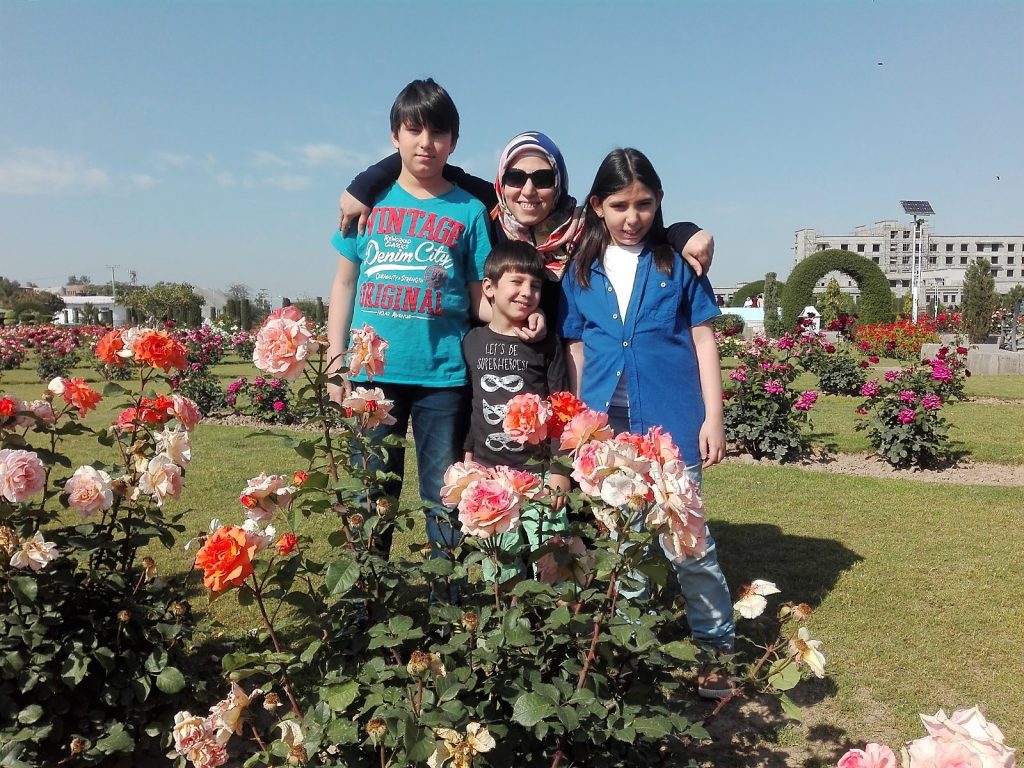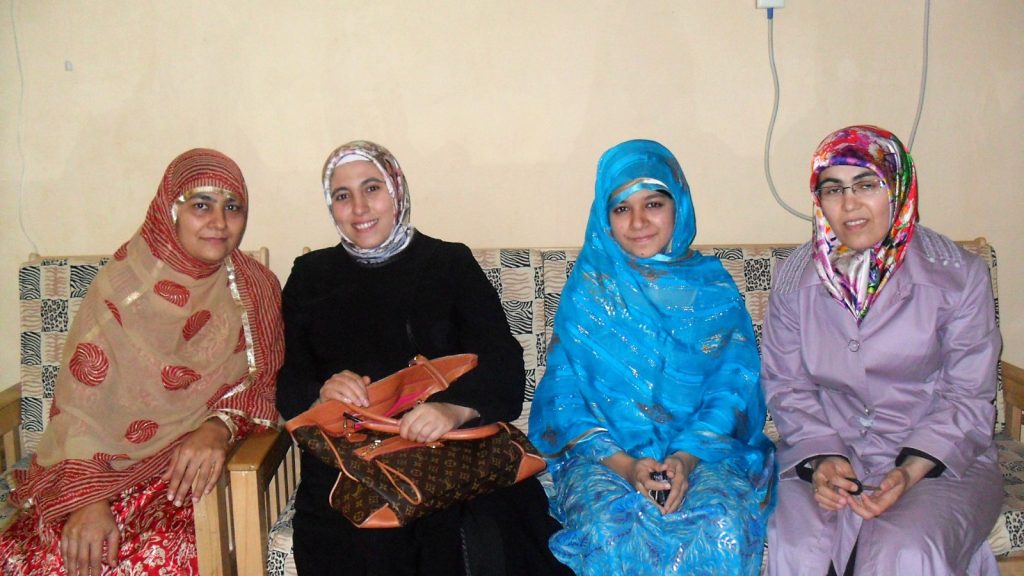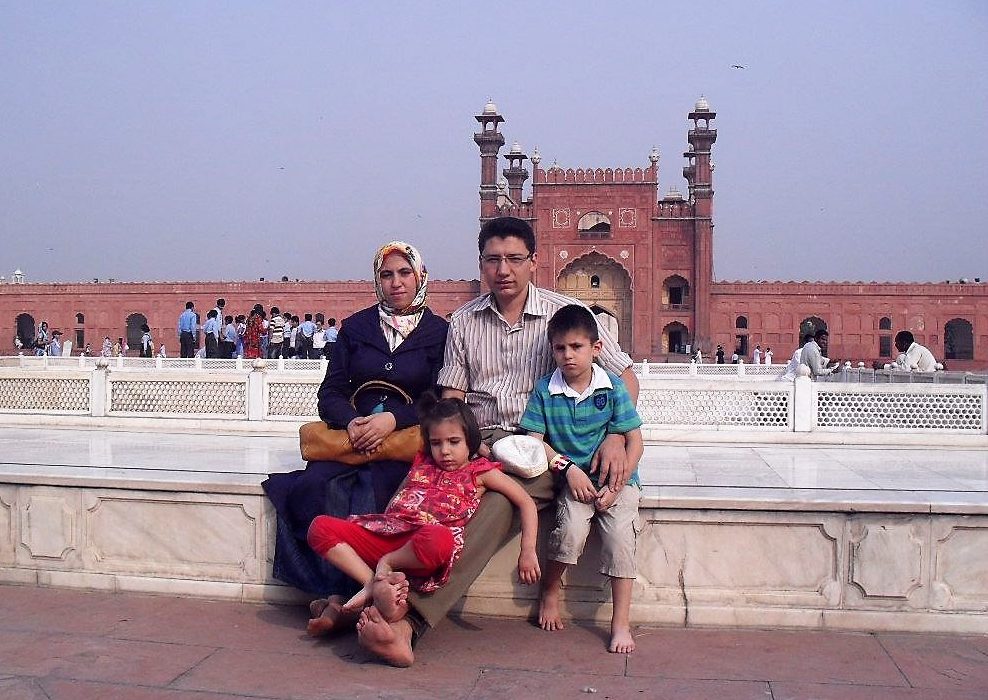Education volunteer Sevda Arslan (1): I learned to live together in Pakistan without judging people

How did the one-day ‘honeymoon’ dream turn out to be a disappointment?
October 3, 2021
Education volunteer Sevda Arslan (2): If we went to Pakistan again, we would love to live in Peshawar as a family
October 6, 2021The activities of the education volunteers who migrated to Pakistan from Turkey were not just about teaching in schools. There were also volunteers who provided guidance and counselling to students and their families in different areas of life, and organized various social activities with them. Ladies came together with the local people to support students with limited means in schools, and they also built bridges among the people of the two countries and sought solutions to their problems.
In this part of our interview series, we interviewed one of those ladies, Sevda Arslan. Arslan, who does not hesitate to go back to the past and face her own mistakes, also narrates how different cultures should be approached, with her experiences and observations. The three children of Mrs. Sevda, who lived in Pakistan for 13 years, dream of returning to this country, which they know as their ‘homeland’, one day.
Can you tell us a little about your life before you went to Pakistan?
I was born in Istanbul. I graduated from Eyüp Imam Hatip High School. I was one of the affectees of the coefficient applied to the graduates of vocational high schools. In 1998, I qualified to be placed in the 2-year accounting associate degree program at the Balıkesir University, and I graduated in 2000. I returned to Istanbul and worked as an administrator and mentor in the tutoring centre where I had once been a student. While we were still students in the tutoring centre, our teachers treated us like grown-ups and assigned us goals. They would consult us about some issues and ask our opinions. I was busy with the students day and night. We had a very nice milieu.
I wanted to go abroad and be involved in educational activities even if I was not meant to teach at the Turkish schools abroad. My and my friends dreams were always about serving abroad. Our tutoring centre administrator also encouraged us on this path by saying, “You should definitely go abroad. Even if you end up a homemaker, be there even if there is no institution to serve; the atmosphere there will always keep you alive.” Normally, education managers do not wish to give their staff away. There was such a notion in Turkey, but that manager was not like that. He put a lot of effort into making this come true himself. He instilled in us that feeling, love, and enthusiasm.
I had also told my family about my wish to go abroad. Even a few friends had gone to a country, but my father did not let me. “You cannot leave without getting married!” he said. I was not thinking of getting married. That’s why I worked in the tutoring centre for a few more years. Meanwhile, I warmed to the idea of marriage. Yet, I made a firm decision; I would definitely not meet those suitors living and working in Turkey. I would only meet if there was someone from outside. Whenever we had a get-together with friends, we always chatted about migrating and serving in the schools abroad. I was in Istanbul, and was working at a place near my home. I had my comfort zone. I understand this better now: It was actually so valuable someone inspired me with that transnational objective.
I INVITED MY HUSBAND’S STUDENTS TO OUR HOME 3 DAYS A WEEK
A friend was a schoolteacher in Siberia. Her parents had let her to go abroad unmarried. She made our dreams come true. It was time for her to return. In Siberia she saw someone teaching Mathematics and she thought he was a convenient suitor for me. Thanks to her, I met my future husband. After being engaged for a year, we got married in 2004 and went to Siberia together. My husband had gone abroad when he had graduated from the university in Turkey, and he had been in Siberia for 4 years. We stayed there one more year together.
Since I had not gone abroad as a teacher, I could not work in an institution. There was not much to do, so I took care of my husband’s students. I invited the schoolchildren to our home 3 days a week. We watched movies together, drank tea and chatted. Spending good times together was actually the best guidance and counselling. I also used to visit my husband’s school for two days week during his mentorship shifts. This was how I spent time with the female students and my husband with the male students. I lived there for one year. We returned to Turkey in the spring. I was pregnant with my first son.
How did the process for Pakistan begin?
We returned to Turkey in April and both us wished to go abroad again. We heard they needed teachers in Pakistan. In June, it was certain we would go there. I was to give birth in July. We would go from a very cold place to a warm place, from a non-Muslim country to a Muslim country. Actually, that comfort made me happy. Siberia was also beautiful. Actually, any place where people live is beautiful, but when we heard about Pakistan, we felt a different excitement.

My husband went to Pakistan 3 weeks before me. When he called, he said, “There are places like Khairpur Mirs and Multan, where there is not always electricity and horse-drawn carriages are used. They also need a math teacher there. That’s probably where we will be.” “Okay,” I said, so I adjusted myself accordingly. We expected little. When he called a few days later, “I have been appointed to Islamabad, there’s a need here too,” he said. I think it was August 18 when I went to Pakistan. My baby wasn’t even 1 month old yet.
Did you do any research on Pakistan about the conditions, cuisine and so on?
A friend with whom I had worked in the tutoring centre had gone to Pakistan two years before me. I was in constant touch with her. In the letters she wrote she used to describe her life in Pakistan. “It’s very hot here. Now the sounds of children are coming from outside. I love the people here so much…” I had no idea that I would go to Pakistan. She even came to Turkey and stayed for a while. She talked a lot about Pakistan when we met. She explained that people were very friendly, but she had a hard time learning English. “I wish I had gone there after learning English,” she said. She also tried to learn English and become a teacher there.
Within a year, her dreams came true. She both learned English and started teaching. I valued this example a lot. I could observe her objective. I mean, thanks to her, I knew Pakistan and the people there more or less. She used to live in Islamabad, but just when I was to go there, she and her husband moved to Karachi. There were no direct flights from Turkey to Islamabad. You needed to take a connecting flight from Karachi. I landed in Karachi and met her first. I stayed with her for a day before taking a flight to Islamabad.
I guess traveling alone with a new-born was difficult…
Actually, something interesting happened on board. Seated on my left and right were male passengers. I had to breastfeed my baby. I asked the hostess to change my place, but she was not much helpful. She said things like, “Negotiate places among yourselves.” The plane was full. A woman who looked both Pakistani and Turkish was seated nearby, and she had her two daughters with her. When she saw my anxious state, she said, “Come here, let’s request the male passenger here to take your place there.” We swapped places. This was how I met Sister Nilgün; a Turkish lady married to a Pakistani gentleman. She had lived in Pakistan for 25 years as of then. They had a connecting flight from Karachi to Islamabad, while I stayed for a day more. I will never forget the Sister Nilgün’s timely support. Allah sent her to my aid for sure.
WHEN I TURNED ON THE LIGHT, I SAW THE ROOM WAS FULL OF HUGE INSECTS
What were your first impressions and first memories of Pakistan?
At first, you think “How on earth will be able to live here?” When I got off the plane, I experienced the same surprise everyone had: “Is this the air temperature or the heat from the aircraft engine?” Not everything was rosy, of course. I’m generally impatient, and I was tested by this trait. The first time we arrived in Islamabad, we stayed at a friend’s house because it was hard to find a house quickly. Since I insisted we should immediately rent a house, my husband found a house but had not inspected it. The couple who hosted us were teachers and they worked during the day. I was embarrassed to stay longer there, because one feels like a burden with a young baby. Even though they insisted, “Stay here for another week, shift to your home after cleaning up,” I decided to move to our rented home the day after. While trying to sleep at night, I woke up to the sound of my baby screaming. I lifted his bed sheet and shocked to see he was surrounded by cockroaches. When we turned on the light, we saw all the walls were full of huge insects. I never had seen so many insects in my life.
There was a newly married couple living next door to us, I called them. They opened a room for us. I had left the first house not to disturb our hosts for more, but I disturbed other people again. It was also very good for that friend. Whenever her husband left for work, she was afraid at home. It was good I stayed with her. Meanwhile, we got the house fumigated. When we went there a few days later, we saw everywhere was covered with bugs like carpets. I had been very angry with my husband that night, but I had rushed him to move in quickly. That night I saw one elder in my dream. He said “Did you think everything would be so easy?” It was a great lesson. I experienced that while I expected everything to happen as I wished. Actually, we learned right there and then.
What did you experience during the adaptation process? Did you face any difficulty due to lack of English proficiency?
We had a Sister Zeynep there. During our first week in Pakistan, she invited me somewhere. It would be my first time to have an English conversation with Pakistani ladies visiting another sister’s house. Friends’ English was not so good either; everyone could say one or two full sentences, but it was such a nice atmosphere. I thought, “O Allah! You have brought me to a place like heaven. How enthusiastic these people are!” Those with slightly better English formed longer sentences, and everyone tried to explain as much as they knew. Sister Zeynep said: “This is how we started here. You coincided with the first day too. Are you in for doing something together?” I replied, “I’m in, but I don’t speak English.”

There was an English language school I could go to, but nobody liked it. They would simply say, “You’ll fare better if you don’t go there!” Some things were spread by rote on bush telegraph. I also had a young baby and we did not have a car. Our friends did not take taxis, as it might not be safe. My husband allowed me. He accompanied me a few times, but it would not go that way. Eventually, he said “These people won’t hurt you, take a taxi yourself from now on.” Thankfully, I experienced nothing dangerous. I also hired a babysitter. The language school was far from home. Sometimes there were lessons, sometimes not, but I kept on praying, “O Allah! I’m trying, I’m coming this far, please favour me!” Sometimes when the babysitter did not come, I would go to the language classes with my baby. Sometimes the teacher would not come. I met Afghan and Chinese girls there. We practiced. I am not proficient in English, but at least I learned what to talk to people in the first place. I was pregnant with my second baby; so, I gritted my teeth for 6 months and continued the classes until the birth. Teacher Zeynep’s attitude was very crucial there, she supported me all the way. Everyone said something like, “How on earth do you go to classes on your own? What if something happens to you?” Actually, they were somewhat right. For example, some taxis did not have side mirrors. The driver would turn his head out from the window when he would look the traffic behind him.
WHENEVER I SAID ‘MY SON’S NAME IS BAHADIR’, PEOPLE WOULD BE GREATLY INTERESTED
It is often said taxis are not safe for women…
Thank goodness nothing happened. I had a baby with me. The drivers would ask his name, and I would say ‘Bahadır’. They would rejoice and say, “Oh, Bahadur Khan!” Bahadur Khan is the name of a significant historical figure in Pakistan, a Ghaznavid ruler. When the name Bahadur was mentioned, people would stop in their tracks. When they heard the word “Bahadur”, they looked at you differently thinking, “These people are Turkish, but they named their children after a figure we value.” When it was not certain we would go to Pakistan, one elder had named our baby Bahadır’ before his birth. We experienced the wisdom of this name when we went to Pakistan later.
What kind of activities did you do in Pakistan? Did you have any difficulties due to cultural differences?
Since I was not a teacher, I used to spend my time with the parents of the students and with my Pakistani lady friends. I learned to talk to people, albeit with a smattering. The month of Ramadan started shortly after we went in the first year. I was also attending to the language school. It was very hot. Iftars would be held in the garden of the school. The food was too spicy and oily for my taste. It did not suit my taste but I ate it. I was fasting, and I thought I should not disturb the flow. What would be the point of being there when you did not eat the local cuisine and sit at people’s tables?
We Turks are a little biased. We wish everyone to be like us. We cannot give up our habits easily. These were breaking points for me. I always told the newcomers the good sides of Pakistan, saying to myself, “If they see the negative, let them see for themselves.” That friend might never consider that thing negative, contrary to my first opinion about it. Why should I influence her? I learned this from Teacher Zeynep: You can customize the dishes to your own taste. If it is spicy, add some yogurt on it. When you go home later, you may already have your iftar, but you have to sit at that table with those people.
I met people. I got their phone numbers. I invited them to my home. Yet, it was very difficult to understand and speak English on the phone. The local English accent sounded different. It was easier to communicate by texting. We had an older sister whose husband was a translator at the Turkish Embassy. She knew Turkish and Urdu well. She became our friend. We jointly organized ‘Cooking Classes’ and had conversations. She volunteered as our interpreter. Allah bestowed her to us. Language matters little, only if you sincerely wish to do something, Allah sends helpers.
To be continued…





No Comment.